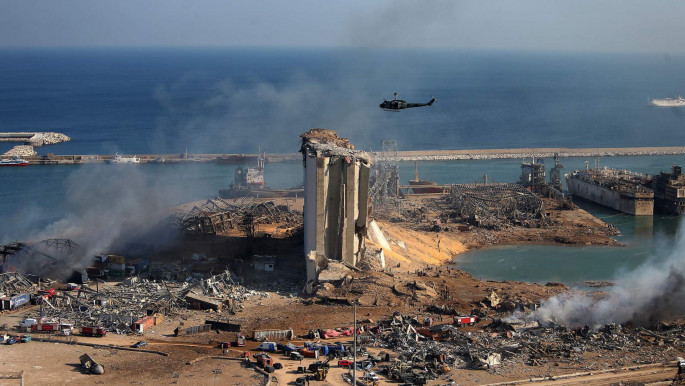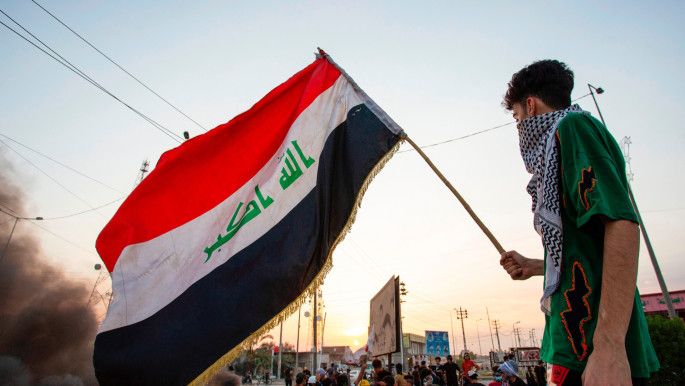Iraqis living near dangerous weapons stockpiles fear a Beirut-style disaster
The blast was linked to 2,750 tonnes of ammonium nitrate, a chemical widely used around the world as a fertiliser or for explosives in mining, which had been stored in the port.
Following the tragedy, there have been global concerns about the chemical's storage. In Iraq, where weapons caches are stored in urban centres and unexploded ordnances litter border areas, these fears are acute.
"What happened in Beirut is a wake-up call to the Iraqi government to remove high-risk materials and other chemicals from warehouses in ports and airports and build well-designed and protected stores to save them properly," Emad Ali, 43, from Basra told The New Arab.
He said the government must take "tangible measures" to remove munitions belonging to both the state and militias from populated areas.
"Basra's temperature has reached 52C, that means that chemical materials could easily explode," Ali added. "It is unjustified for the government to keep weapons near residential neighbourhoods".
 |
What happened in Beirut is a wake-up call to the Iraqi government to remove high-risk materials and other chemicals from warehouses in ports and airports |  |
In 2019, a huge explosion rocked a weapons depot linked to Iranian-backed militias in Dora near Baghdad, sending projectiles into surrounding neighbourhoods. The incident created a tangible sense of dread for many Iraqis that it could happen again.
Sarkawt Shamsulddin, a member of the Future bloc in parliament, told The New Arab that such explosions should be a warning to take future precautions.
 |
|
| Beirut Explosion: Be angry, not just sad, for Lebanon |
"Actually, it happened in Erbil and Sulaymaniyah a couple times on a smaller scale when Peshmerga and militia weapon stores exploded this year and last year. We cannot be sure it was done intentionally to destroy evidence or not," he said.
"But having this kind of explosion in Beirut should warn the Iraqi and Kurdish government to take precautions and to really remove all the military and chemical storages outside of the cities to take further precautions to prevent any blast or incident like Beirut".
Responding to public fears after the Beirut explosion, Iraq announced it would create an inventory of all hazardous materials at ports and airports. Earlier this week, Iraq's military removed "dangerous materials" from Baghdad's International Airport, with the material relocated to the Military Engineering Directorate at the ministry of defence.
Following the deadly explosion in Beirut, Iraqis demonstrated in Tahrir Square to express their solidarity with Lebanon, while calling on authorities in Baghdad to remove weapons and other hazardous materials from city centres. The hashtag "Remove weapons from cities" went viral on Iraqi social media.
 |
This kind of explosion in Beirut should warn the Iraqi and Kurdish government to take precautions |  |
Zaid Abdulwahab, a famous Iraqi journalist, posted a photo on his Twitter account showing a map with the location of at least ten alleged weapons caches in Baghdad. "If the photo is true that weapons caches are inside Baghdad city, that literally means Baghdad is a 'time bomb' against civilians," he said.
"The local and central government should remove the weapons from population areas and relocate them to a safe place, to avoid Beirut-like blasts to happen in our country," Basra resident Mahdi Salih, 29, told The New Arab, adding that Iraq had lost enough people already in the Iran-Iraq war, and most recently against the Islamic State.
 |
|
| The Iraq Report: Political shockwave of Beirut blast reaches Iraq |
"In addition to the state's weapon caches, the militias also have their weapons in their military sites which is supposed to be under state control, but that needs a brave decision from prime minister Mustafa Al-Kadhimi," he added.
Residents in Basra say that tribesmen also have a significant number of weapons beyond the reach of the Iraqi state. "They fight between each other on a daily basis here in Basra city, what is [the government] waiting for to withdraw these weapons from civilians?" Salih said.
There are also many areas in Iraq near its borders with both Kuwait and Iran where unexploded ordnances have still not been cleared.
This residual impact of war can be felt in both Basra and Baghdad, where experts say that radiation from ammunition used in the first Gulf war has led to severe health issues for local residents.
Azhar Al-Rubaie is a freelance journalist based in Iraq. His writing focuses on a variety of issues, including politics, health, society, wars, and human rights.
Follow him on Twitter: @AzherRubaie





 Follow the Middle East's top stories in English at The New Arab on Google News
Follow the Middle East's top stories in English at The New Arab on Google News


